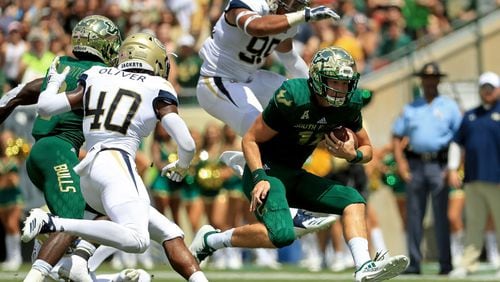To hear Georgia Tech defensive players tell it, their 75 plays against South Florida on Saturday were a steady flow of mental mistakes brought on by the Bulls’ up-tempo pace and the newness of the Yellow Jackets’ scheme.
“We get out there, people are running out of gaps, people not doing their responsibility, not hitting who they’re supposed to hit,” defensive end Desmond Branch said. “That’s how big plays happen. Anyone can score like that when you’re shooting yourself in the foot.”
The loss to USF can be minimized as a non-conference game, with the ACC opener at Pittsburgh coming up this Saturday. But the reality looms that the mistakes have to be corrected quickly.
In the secondary, where the starters against USF were a redshirt freshman (cornerback Tre Swilling), two sophomores with limited playing time last season (strong safety Tariq Carpenter and cornerback Jaytlin Askew) and a grad transfer (free safety Malik Rivera), there were missed assignments. Rivera acknowledged a couple of instances when he was playing closer to the line that he didn’t fill his assigned gap.
“I think we did the best we could,” Rivera said. “I think the tempo affected us maybe a little bit. Not conditioning-wise, just mentally, knowing you need to line up in certain spots, them getting to the line quick. You have to read the formation and get a call at the same time. Sometimes, that can be difficult.”
On the front end, players were getting out of their gaps. Players trying to penetrate the offensive line were going too far away from their position, opening up creases for quarterback Blake Barnett to escape through for scrambles. Other times, players watched the ball rather than play their assignment, falling for ball fakes. Sometimes, players weren’t receiving the play calls signaled in from the sideline correctly.
Defensive end Anree Saint-Amour described an angst that was causing players to try to make plays by going beyond their assignment.
“It’s like, ‘Oh, I’ve got to do this, I’ve got to do that,’ and when you try to get more, you can get caught,” he said.
It perhaps should not come as a great surprise that Tech was making mental errors or misplaying assignments. First, it was the Jackets’ second game using defensive coordinator Nate Woody’s scheme and their first in which they were under the pressure of a high-tempo offense that was requiring them to receive and understand play calls and assignments at a quicker pace than normal. Second, Woody has chosen to play second- and third-string players to keep players fresh and develop depth, a pool of players that includes a number of freshmen and sophomores.
It might be worth noting that, in Woody’s first season at Appalachian State, the defense’s statistical performance was similar to that of the defense in the previous season. Marked improvement only began to show up after a season and a half.
“I think it just come with time,” Rivera said. “It’s a young team, a young defense, especially since they’re all just in their second game of really game speed of playing this.”
It is not an explanation, though, that linebacker and captain Brant Mitchell was willing to endorse.
“We’re two games in, we’ve had a whole camp and a whole spring practice to get it going,” he said. “So, I mean, mistakes are mistakes, and there’s no excuses for it, really.”
Coach Paul Johnson wants the number of players being rotated in by Woody trimmed.
“The coaches are learning the players, and we’ve got to figure out who the players are and play the players,” he said. “It’s not little league; everybody doesn’t get to play. I think the more we play, the more that’ll happen. I think the kids will get better at it.”
Pittsburgh plays a slower pace than does South Florida, but it wouldn’t be a surprise if the Panthers tried to play hurry-up and see how the Jackets handle it, as well as misdirection plays to test the Jackets’ ability to keep their eyes on their keys.
“If you only mess up once and you learn from it, you’ll be good,” Branch said. “If we learn from what happened this last game, I feel quite confident that we’re going to have a really good year from here on out.”







